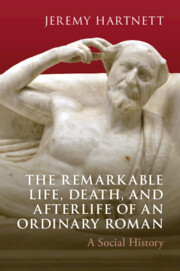Refine search
Actions for selected content:
3 results

The Remarkable Life, Death, and Afterlife of an Ordinary Roman
- A Social History
-
- Published online:
- 16 December 2024
- Print publication:
- 23 January 2025
Chapter 10 - Triclinium Theatricality
-
- Book:
- Living Theatre in the Ancient Roman House
- Published online:
- 22 December 2022
- Print publication:
- 12 January 2023, pp 426-483
-
- Chapter
- Export citation
Chapter 12 - Human and Divine Love in Marsilio Ficino
- from Part IV - Platonic Love during the Renaissance
-
-
- Book:
- Platonic Love from Antiquity to the Renaissance
- Published online:
- 25 August 2022
- Print publication:
- 01 September 2022, pp 201-210
-
- Chapter
- Export citation
